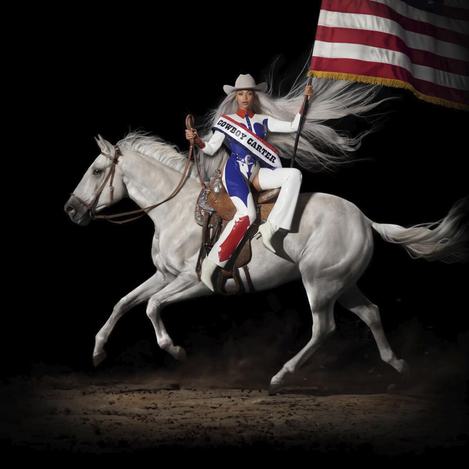With Cowboy Carter, Beyoncé remakes country in her own image
"Cowboy Carter"

Lights. Cameras. Banjo. Let’s go.
Six weeks on from the Super Bowl singles drop that launched a thousand thinkpieces, Beyoncé’s Cowboy Carter at last rides into town – and with quite the entourage in tow.
Round two of the Texan-born, world-slaying artist’s three-act odyssey finds Beyoncé deep in her storytelling bag. Stuffed with interludes and spoken word snippets, it’s a record that sometimes feels overly invested in narrative at the expense of momentum. At 1 hour 19 minutes long, it’s a lot to take in one sitting and being in the saddle does start to chafe, but there’s enough gold here to keep the stars and stripes aloft.
The culmination of a five-year excavation of the American country music archives, Cowboy Carter is intended both as a continuation of 2022’s Renaissance and as a teachable moment that stands tall on its own. But for all the talk about Beyoncé coming to ‘save’ country, Cowboy Carter seems to hold no such intent. What it does do, and very well, is to re-contextualise country music as an art form that draws from traditions going way beyond what the genre’s pale gatekeepers would like us to believe.
White tears about what is and isn’t country, and who it is and isn’t for, are really nothing new. They’re also incredibly boring in an age where music has been, in many ways, democratised, and largely for the better. With Cowboy Carter, Beyoncé makes it abundantly clear that while she’s happy to cosplay certain purist-pleasing tropes, the country music of her heart is a generous broad church.
Taking historical cues from laidback AM radio and the chitlin circuit, the album plays like a theatrical revue. Joining Beyoncé in the spotlight are country pioneers (Dolly Parton, Willie Nelson and the mistreated Linda Martell), fellow pop provocateurs (Miley Cyrus, Pharrell), rap crossover giant Post Malone, and rising Black country artists Tanner Adell and Shaboozey, alongside stellar instrumentalists like Rhiannon ‘Banjo Auntie’ Giddens, whose assist on “Texas Hold ‘Em” nails the yeehaw agenda.
Hitting her stride immediately with powerful curtain raiser “Ameriican Requiem”, Beyoncé wastes no time in laying out her country credentials and pain at having them so coldly dismissed. But it’s not sympathy she’s after; if mainstream country can’t stand her, she’ll leave it choking in the sawdust as she hoedowns on regardless. The by now familiar “16 Carriages” goes even deeper, adopting a classic country ballad structure, if not sound, to recount the grind and sacrifice of the early Destiny’s Child years and the pressure of needing to succeed.
Family matters dominate Cowboy Carter’s opening stretch: Beyoncé's parents’ divorce (“16 Carriages”), her daughters growing up (“Protector”) and, on her creative reworking of Dolly Parton’s “Jolene”, a nod to Lemonade’s ‘Becky with the good hair’ incident. Parton herself dials in to draw comparisons between her auburn-haired hussy and Beyoncé’s one-time rival, but where Parton pleaded, Beyoncé shows her teeth.
It's in off-script moments like this that Cowboy Carter often works best. The gripping murder/revenge ballad “Daughter” suddenly bursts into a passage from Italian aria “Caro Mio Ben”, while “Spaghettii” layers sharp shooting rap over borrowed Brazilian funk, before dissolving into sampled street noise and a dreamy acoustic coda. “Genres are a funny little concept, aren’t they?” Martell teases at the start, with all the confidence of someone about to set a lioness among the pigeons.
It's a trick that Cowboy Carter repeats often in its final stretch, amping up the curled-lip, chaotic good swagger. “Ya Ya” is pure psychedelic soul meets rock and roll joy. Part homage to the late Tina Turner (who once worked the chitlin circuit, and whose own country effort turns 50 this year), it gleefully references Nancy Sinatra and the Beach Boys, interpolating their classic “Good Vibrations” – and is that an Elvis impression I hear? Anything’s possible with rodeo queen Bey. Just look at “Tyrant”, which marries folk fiddle to smooth R&B, and the three-ring circus of the snap-happy, Grammys-dragging “Sweet ★ Honey ★ Buckiin’”.
Where Cowboy Carter is less concerned with turning the country world on its head, the results can be spotty. Her played-straight Beatles cover “Blackbiird” feels a bit like shooting a .45 Colt at the blazing Texan sun. Musically it’s pointless, but you can understand her motivation. “Bodyguard” is too edgeless altogether and beneath someone of Beyoncé’s reputation, and, honestly, the Willie Nelson set dressing doesn’t bear repeating. “II Most Wanted”, on the other hand, feels effortlessly top-drawer country. Miley Cyrus was born with this kind of song in her mouth, and Beyoncé more than holds her own.
Dense and immaculately detailed, nothing about Act II is accidental, and no one could begrudge Beyoncé her moment in the centre of the rodeo ring. There’s no question that Cowboy Carter is a landmark record. Arguably, an inevitable one. But once the dust of its audacity settles, it misses the mark of a classic.
Get the Best Fit take on the week in music direct to your inbox every Friday

Emma-Jean Thackray
Weirdo

Viagra Boys
Viagr Aboys

William Tyler
Time Indefinite





